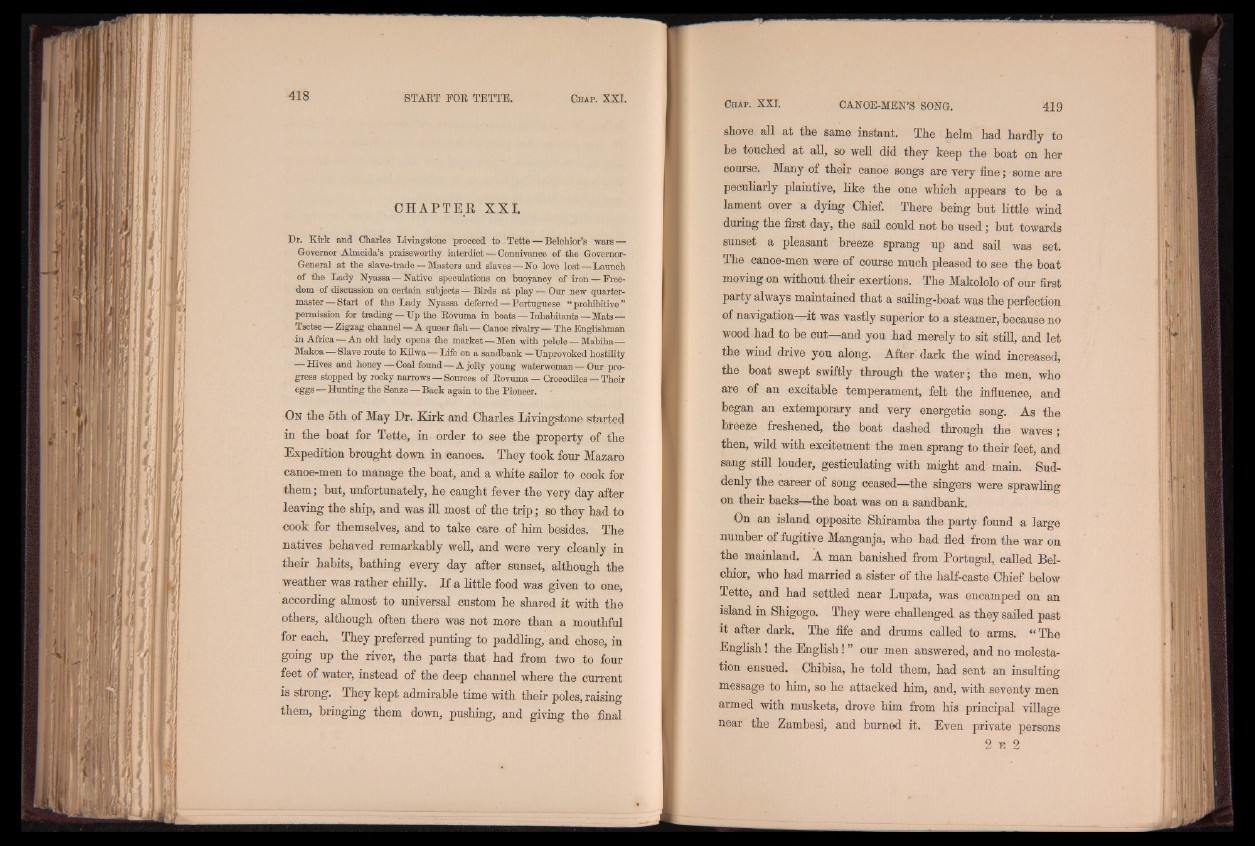
C H A P T E R XXI .
Dr. Kirk and Charles Livingstone proceed to Tette — Belchior’s wars —
Governor Almeida’s praiseworthy interdict — Connivance of the Governor-
General at the slave-trade — Masters and slaves — No love lost — Launch
of the Lady Nyassa — Native speculations on buoyancy of iron — Freedom
of discussion on certain subjects — Birds at play — Our new quartermaster
— Start of the Lady Nyassa deferred — Portuguese “ prohibitive ”
permission for trading — Up the Rovuma in boats — Inhabitants Mats —
Tsetse—Zigzag channel — A queer fish — Canoe rivalry — The Englishman
•in Africa — An old lady opens the market—Men with pelele—Mabiha—-
Makoa—Slave route to Kilwa — Life on a sandbank —Unprovoked hostility
—Hives and honey — Coal found — A jolly young waterwoman— Our progress
stopped by rocky narrows — Sources of Rovuma — Crocodiles — Their
eggs—Hunting the Senze—Back again to the Pioneer.
On the 5th of May Dr. Kirk and Charles Livingstone started
in the boat for Tette, in order to see the property of the
Expedition brought down in canoes. They took four Mazaro
canoe-men to manage the boat, and a white sailor to cook for
them; but, unfortunately, he caught fever the very day after
leaving the ship, and was ill most of the trip ; so they had to
cook for themselves, and to take care of him besides. The
natives behaved remarkably well, and were very cleanly in
their habits, bathing every day after sunset, although the
weather was rather chilly. If a little food was given to one,
according almost to universal custom he shared it with the
others, although often there was not more than a mouthful
for each. They preferred punting to paddling, and chose, in
going up the river, the parts that had from two to four
feet of water, instead of the deep channel where the current
is strong. They kept admirable time with their poles, raising
them, bringing them down, pushing, and giving the final
shove all at the same instant. The helm had hardly to
be touched at all, so well did they keep the boat on her
course. Many of their canoe songs are very fine; some are
peculiarly plaintive, like the one which appears to be a
lament over a dying Chief. There being but little wind
during the first day, the sail could not be used; but towards
sunset a pleasant breeze sprang up and sail was set.
The canoe-men were of course much pleased to see the boat
moving on without their exertions. The Makololo of our first
party always maintained that a sailing-boat was the perfection
of navigation—it was vastly superior to a steamer, because no
wood had to be cut—and you had merely to sit still, and let
the wind drive you along. After dark the wind increased,
the boat swept swiftly through the water; the men, who
are of an excitable temperament, felt the influence, and
began an extemporary and very energetic song. As the
breeze freshened, the boat dashed through the waves;
then, wild with excitement the men sprang to their feet, and
sang still louder, gesticulating with might and main, Sud-
denly the career of song ceased—the singers were sprawling
on their backs—the boat was on a sandbank.
On an island opposite Shiramba the party found a large
number of fugitive Manganja, who had fled from the war on
the mainland. A man banished from Portugal, called Bel-
chior, who had married a sister of the half-caste Chief below
Tette, and had settled near Lupata, was encamped on an
island in Shigogo. They were challenged as they sailed past
it after dark. The fife and drums called to arms. “ The
English! the English! ” our men answered, and no molestation
ensued. Chibisa, he told them, had sent an insulting
message to him, so he attacked him, and, with seventy men
armed with muskets, drove him from his principal village
near the Zambesi, and burned it. Even private persons
2 pi 2